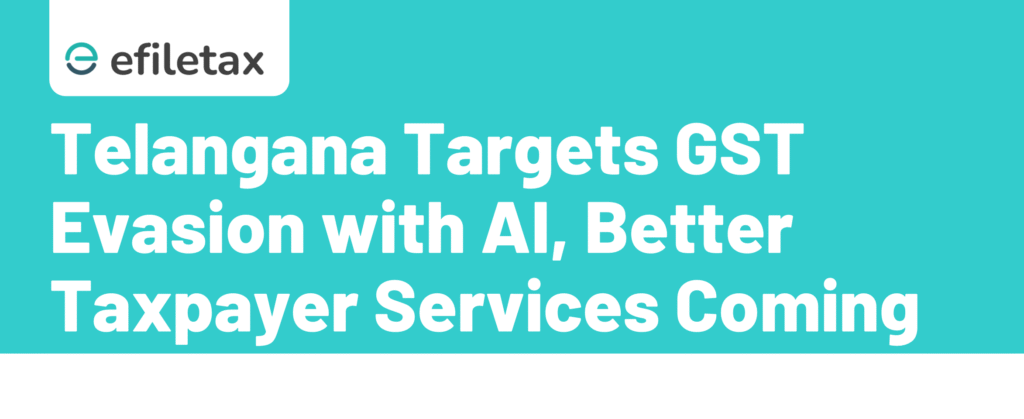
Crackdown on GST Evasion: What Telangana’s Push Means for You
Telangana’s Chief Minister recently called for a crackdown on GST evasion — with a strong focus on AI tools, stricter enforcement, and improved taxpayer services. This signals a serious policy shift not just in Telangana, but likely across other states too.
Here’s what this means for business owners, accountants, and taxpayers in practical terms.
Why the Focus on GST Evasion Now?
At a review meeting with the Commercial Taxes Department, the CM highlighted:
- Revenue leakage due to bogus billing and fake registrations
- Need to intensify GST audits and analytics-based inspections
- Push for voluntary compliance through taxpayer education
The state plans to integrate AI and data intelligence into tax systems — aligning with CBIC’s 2025 vision for smarter GST enforcement.
Key Areas Where AI Will Be Deployed
Expect AI to support GST officers in:
- Detecting fake invoice chains (e.g., circular trading)
- Flagging suspicious ITC claims using pattern analysis
- Identifying non-filers or under-filers through e-way bill vs. GSTR mismatch
- Enhancing risk-based scrutiny for high-value taxpayers
This will make compliance monitoring real-time and predictive, not reactive.
For Businesses: What You Should Do Now
With this crackdown on GST evasion, small and mid-sized businesses must tighten compliance. Here’s how:
✅ Match GSTR-2B with purchase registers monthly
✅ Keep full documentation for ITC claims
✅ Avoid vendors without active GSTN or proper invoices
✅ File GSTR-1, GSTR-3B, and annual returns timely
✅ Watch out for Section 122 penalties (100% of tax evaded)
Telangana’s Reforms in the Larger GST Context
Telangana isn’t alone. Several states are moving in the same direction:
| State | Recent GST Initiatives |
|---|---|
| Maharashtra | Special task force for shell companies |
| Tamil Nadu | e-Way bill analytics + drone mapping of godowns |
| Gujarat | AI-powered fake ITC crackdown |
The GST Council too has supported faceless audits and real-time analytics dashboards, signalling a pan-India move toward digitised enforcement.
Legal Reference and Enforcement
Section 67, 69, and 70 of the CGST Act empower officers to:
- Conduct inspections and search
- Arrest in serious tax evasion cases
- Summon persons and demand documents
Rule 86A allows blocking of input credit if ITC is found to be fraudulently claimed.
This has been upheld in cases like M/s Radha Krishan Industries vs. State of H.P., where the Supreme Court validated use of preventive powers under GST laws.
Expert Insight
“AI-driven compliance isn’t optional anymore. With states like Telangana investing in tech-based enforcement, businesses must get their GST house in order — or face audit heat.”
— CA P. Anuradha, GST Faculty & Consultant
Efiletax Can Help You Stay GST-Compliant
At Efiletax, we offer:
- GSTR-1, 3B, 9 filing packages
- Input Tax Credit reconciliation tools
- Audit-ready document storage
- Advisory on evasion notices, summons, and GST audits
Avoid penalties. Stay updated. Let Efiletax handle your GST.
Summary
Telangana CM has called for a major crackdown on GST evasion, focusing on AI integration and taxpayer services. Businesses must prepare for stricter audits, real-time monitoring, and fake ITC detection. Learn what this means for your GST filings and how to stay compliant.
FAQs
Q1. Will AI-based GST audits increase across India?
Yes, CBIC and state departments are adopting AI to flag risks and monitor filings in real-time.
Q2. What are signs of GST evasion that can trigger an audit?
Mismatch in GSTR-1 vs. 3B, high ITC claim without matching 2B, multiple registrations at one address.
Q3. Can I claim ITC from unregistered or suspicious vendors?
No. You must verify your vendor’s GST status and ensure their returns reflect your invoice.
Q4. What happens if my ITC is blocked under Rule 86A?
You’ll be denied credit till the officer is satisfied. File replies, submit documents, or take legal action.